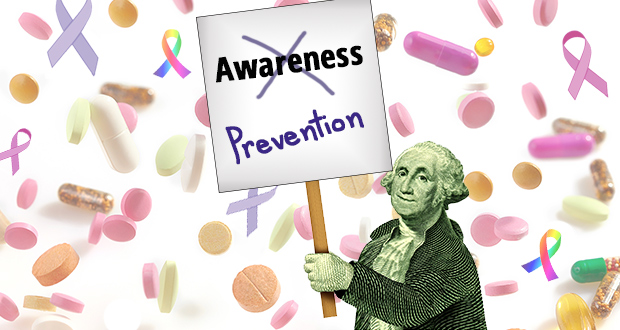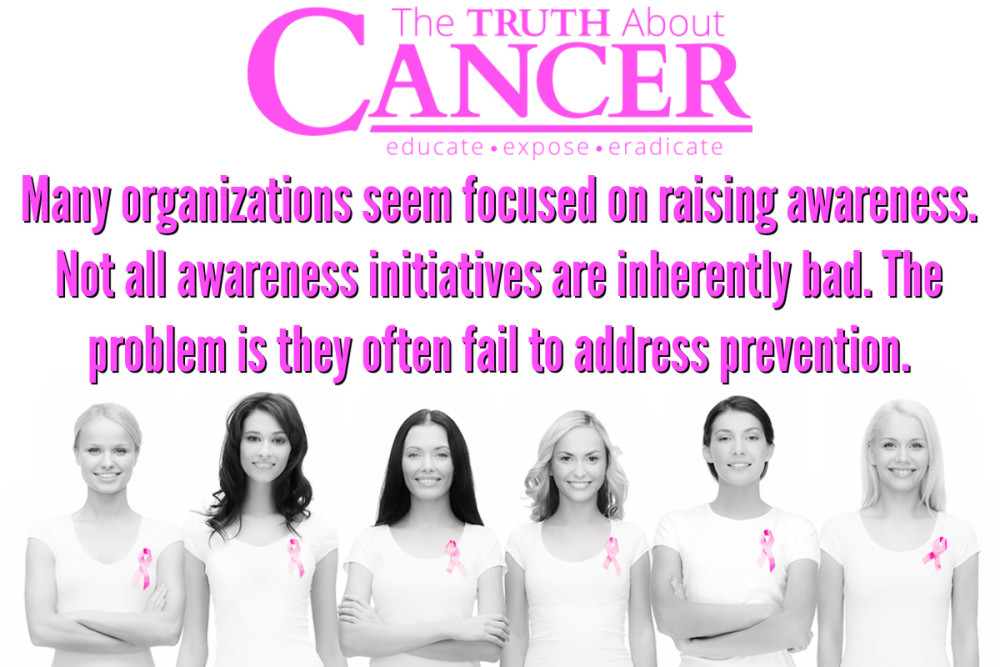Everything these days seems to be focused on raising awareness about something. Autism, mesothelioma, global warming, saving the whales… we’re constantly bombarded with so-called “consciousness campaigns.” These campaigns are designed to grab our attention and direct it towards a particular cause. A cause which we’re apparently supposed to just acknowledge while handing over our money.
Not to make light of some of the more pressing issues of our day, raising awareness can and does have its place. If all those billboards warning about the dangers of second-hand smoke never existed, for instance, many more parents might still be smoking cigarettes in front of their children. Hence awareness of second-hand smoke may be credited with reducing risk of lung disease and cancer.
In other words, not all awareness initiatives are inherently bad. The problem lies in what these campaigns often fail to address, particularly when disease is involved: prevention. Perhaps you didn’t even realize that February has been designated as National Cancer Prevention Month. This is because most of the major cancer foundations have chosen to focus on awareness instead of prevention.
Cancer Prevention is Infinitely More Important than Awareness
Most everybody knows that October is Breast Cancer Awareness Month. That’s because it’s the time when pink ribbons show up on everything from t-shirts and bracelets, to fried chicken buckets and alcoholic malt beverages. This pink ribbon blitzkrieg is little more than a marketing ploy by the Susan G. Komen Foundation to remind people to donate money to cancer research.
No-Shave “Movember” is another similar awareness campaign. Rather than pink ribbons, it’s branded by men not shaving their mustaches in solidarity against prostate cancer. Like Komen, Movember seems to be primarily about raising awareness that prostate cancer exists so people will donate more cash for cancer research.
Both of these events, which are heavily publicized in the major media every year, deal almost exclusively with awareness at the expense of prevention. Neither campaign makes even the slightest mention of any practical ways that men and women can avoid prostate and breast cancer. This is why rates of both diseases continue to soar despite a windfall of generous financial donations.
National Cancer Prevention Month, on the other hand, is more closely aligned with what we try to do here at The Truth About Cancer. That is to educate people about practical ways that they can avoid cancer altogether. Lifestyle modifications such as dietary changes and exercising have been shown to significantly reduce risk. Many people will also benefit from supplementing with high-potency nutrients to address underlying health conditions that may contribute to cancer formation down the road.
Cancer Awareness is a Chemical Industry Ploy
Something about the way cancer awareness campaigns typically operate has never really sat well with me. In many ways, groups like Susan G. Komen seem to almost go out of their way to avoid talking about things that we already know cause cancer. Chemical carcinogens being just one example among many.
When I started scratching a little deeper beneath the surface, I came to the disturbing realization that cancer awareness is often cancer propaganda in disguise. Various industries that stand to lose billions of dollars in profits if their products were exposed for causing cancer are the same ones driving the awareness push behind the scenes.
Consider the fact that Breast Cancer Awareness Month is a creation of the chemical industry. It was launched in 1987 as a way to point people away from one of the leading causes of cancer today − toxic chemicals. British chemical giant AstraZeneca, formerly owned by Imperial Chemical Industries, had to figure out a way to protect its interests from scrutiny, and “cancer awareness” was the solution.
“The primary sponsor of Breast Cancer Awareness Month, AstraZeneca (formerly known as Zeneca), is a British-based multinational giant that manufactures the cancer drug tamoxifen as well as fungicides and herbicides, including the carcinogen acetochlor,” explains a report put out by the Sierra Club in its Sierra Magazine.
“Its Perry, Ohio, chemical plant is the third-largest source of potential cancer-causing pollution in the United States, releasing 53,000 pounds of recognized carcinogens into the air in 1996.”
Among these cancer-causing chemicals is the now-banned chemical DDT (dichlorodiphenyltrichloroethane), a persistent chemical pollutant that’s been linked to male infertility, miscarriages, low birth rate, developmental delays, nervous system and liver damage, and you guessed it… breast cancer.
Cancer Prevention is the Best Medicine
Once you know the truth about the cancer awareness scam, it’s difficult to take any of these campaigns seriously. People who support them obviously mean well, but as they say, the road to hell is paved with good intentions! Exposing the truth and teaching people to prevent cancer rather than just be aware of it is far more important than just talking about cancer. This is why I do what I do.
And while National Cancer Prevention Month might also be considered an awareness campaign, at least it’s one that’s raising awareness about prevention. That I can get on board with! The advice offered by this campaign is by no means comprehensive or even entirely accurate, but at least it’s pointing people towards actual solutions rather than empty rhetoric.
Where National Cancer Prevention Month gets things right is in urging people to eat healthier and exercise daily. Nutrition is a key component to cancer prevention, as is keeping that blood flowing and working those muscles. And the campaign also warns against cancer-causing foods like processed meats, refined sugars, and empty calories, all of which are known to contribute to cancer.
Where National Cancer Prevention Month gets things wrong is in advising people to avoid all red meat.They make no distinction between organically-raised, pasture-centered meats high in beneficial omega-3s and conjugated linoleic acid (CLA), and factory-farmed, grain-stuffed meats high in cancer causing omega-6s.
There’s a lot of other prevention advice that National Cancer Prevention Month fails to mention, such as upping intake of vitamin D intake, and avoiding chemical-laden household cleaning products. But getting prevention on the national radar is still a positive step in the right direction, and it’s only just the first among many as we press onward towards making cancer a thing of the past.
Article Summary
Everything these days seems to be focused on raising awareness about something. Not all awareness initiatives are inherently bad. The problem is that these campaigns often fail to address prevention.
The pink ribbon campaign for Breast Cancer Awareness is little more than a marketing ploy by the Susan G. Komen Foundation to remind people to donate money to cancer research.
Breast Cancer Awareness Month is a creation of the chemical industry. It was launched in 1987 as a way to point people away from one of the leading causes of cancer today − toxic chemicals.
The primary sponsor of Breast Cancer Awareness Month is AstraZeneca (formerly known as Zeneca). A British-based multinational giant that manufactures the cancer drug tamoxifen as well as fungicides and herbicides, including the carcinogen acetochlor.
Exposing the truth and teaching people to prevent cancer rather than just be aware of it is far more important than just talking about cancer.





















Thanks Ty for all you do to educate us about cancer. My mother died from cancer 10 years ago and I wish I had the info I gleaned from your annual summit back then.
I was not aware there was a Cancer Prevention month – hope they are open to improve upon the info they share so they can really make a difference in cancer prevention.
Oh!! Love the new website too.
I love these changes to the webstie. And thank you Ty for all you do.
Thank you so much! The new design is awesome. Love the bullet points. Don’t always have time to read the entire article.
You have said exactly what I have been trying to tell my friends and family! My biggest fight is the ridiculous amount of chemicals and preservatives we are all exposed to on a daily basis. I am making my own cleaning solutions, eliminated parabens from my face and body care routine, and going as organic as we can in my house. It’s not easy but being a breast cancer survivor, I can tell you, making these changes is so much easier than chemo and radiation treatments! I am realistic and know that there is no sure way to keep cancer from striking again, but anything I can do, to reduce my risk, I will do. I wish more people would understand.